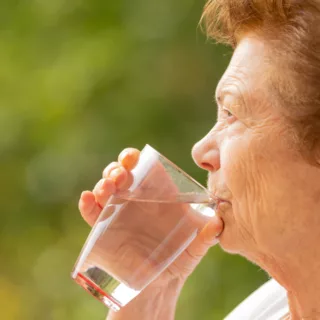Water is Key To Senior Health During a Heat Wave
Water is Key To Senior Health During a Heat Wave

Tip: Drinking water on a regular schedule is especially important for older adults
Water. Just plain pure water is the real fountain of youth for older adults. Unfortunately, around the world many seniors do not have easy access to an adequate supply. One of the most common reasons someone living in a nursing home is transferred to the hospital is because they became dehydrated. Older adults have less water in their bodies to start with than younger adults and many older adults are on medications that push water that accumulates in their legs or lungs out. The problem is the fluid going out also contains vital minerals like sodium and potassium.
Additionally a natural part of aging is a reduction of what triggers our brains to be thirsty and stimulate us to drink. Seniors should be careful relying too much on only drinking when they are thirsty. Many drinks that we consume like soda, coffee, tea and especially alcohol are not as effective as plain water in preventing dehydration. The other problem that older adults have in consuming enough water is often their bladders cannot hold onto their urine as well as it did when it was younger. This leads them to not drink even when they are thirsty for fear and embarrassment of wetting themselves or having to race to the bathroom at an awkward time.
Water is necessary for nearly every bodily function, from lubricating joints to regulating body temperature and pumping blood to the muscles. Researchers say that as people age, they need to drink more water to compensate for changes in their body temperature regulation. They say dehydration can cause a number of ailments, including muscle pain, fatigue, and confusion.
Seniors especially older men are less likely to be wary and more likely to ignore signs of dehydration. They never experienced the severe symptoms associated with dehydration and, when they recall the times when they were dehydrated when they were younger, the problems were usually mildly and they were able to compensate without much effort. Unfortunately, that compensation mechanism does not work as well when we get older and we are much more at risk especially with exercise or very warm environments. Even being slightly dehydrated to 98 percent of normal can affect one’s metabolism negatively and reduce organ performance. Aging also decreases a person’s ability to sweat and less sweating reducing the body’s ability to cool in a hot environment. Older adults may have more trouble noticing that they are becoming overheated and thus more vulnerable to heat-related illness such as heat stroke.
Although it is true that many older adults complain how hard it is to feel warm (because of loss of fat below the skin), hot weather is much more dangerous. My best advice is to schedule yourself to drink water regularly rather than waiting to feel thirsty.
Noah S. Marco
LOS ANGELES JEWISH HEALTH CHIEF MEDICAL OFFICER (CMO)